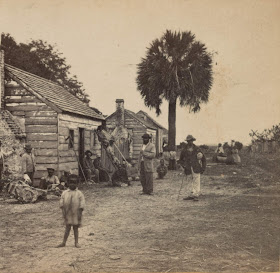My musings on American, African American, Southern, Civil War, Reconstruction, and Public History topics and books.
Wednesday, February 27, 2019
More Fripp Plantation Photographs
Yesterday, I shared a photograph from the Library of Congress website showing a slave dwelling from the Fripp plantation on St. Helena Island, South Carolina. At the time, I did not notice that more images were available. Some of the additional photographs indicate they were possibly taken on the Thomas James Fripp plantation.
In searching through the 1860 slave schedules I did not find a Thomas James Fripp listed among the listed Fripp slaveholders. However, I did find a Thomas B. Fripp and a J.T.E. Fripp, perhaps these photographs show the plantation of one of those. Regardless, these shots make for some intriguing images of plantation life.
The top image shows the Fripp big house. The home displays Italianate features and a long elevated porch. It also appears to have an English basement. Several of the white family members stand on the porch. One holds a young horse.
The next photograph shows five women. All hold babies and they are standing in a slave quarters street. Two of the women wear headwraps, while one of them wears a polk-a-dot dress.
The final image is also taken from the vantage of the slave quarters street. At least 21 individuals appear within the photograph's scope. One's sight is automatically drawn to the child in the foreground. He, or perhaps she, wears a long shirt. This type of garment was common for enslaved children until they came of age to wear pants or dresses. Like the middle image, a palm tree graces the street. A ladder rests against the cabin nearest the cameraman with two young men sitting on it. By the cabin's door an old man and old woman sit on a bench. What appears to be a long-handled hoe also rests against the cabin's front. In the background a woman and two girls sit on what looks like a large kettle of some kind. Maybe the large vessel was used for scalding hogs. A wood slab fence connects the two cabins and perhaps pinned in some chickens, a hog, or cow. Or maybe the fence protected a vegetable garden shared by the families who lived in the dwellings.



Tim, I knew that I had seen the picture of the slave women with the babies before. That picture appears in The Untold Civil War - Exploring The Human Side of War by James Robertson. But you probably already knew that.
ReplyDeleteHi Paul! The Untold Civil War has some amazing photographs. A great book!
ReplyDelete